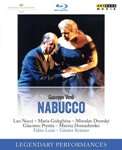|
Back
12/31/2015
Giuseppe Verdi: Nabucco
Leo Nucci (Nabucco), Maria Guleghina (Abigaille), Giacomo Prestia (Zaccaria), Marina Domashenko (Fenena), Miroslav Dvorský (Ismaele), Vienna State Opera Orchestra and Chorus, Fabio Luisi (Conductor), Günter Krämer (Stage Director)
Recorded live at the Vienna State Opera (2001) – 126’
Arthaus Musik Blu-ray disc 109158 (or DVD 109157) – Notes in English, French, and German – Subtitles in English, Italian, German, French, and Spanish (Distributed by Naxos of America)

   
This DVD is one of Arthaus Musik’s “Legendary Performances” series; alas, it doesn’t belong there.
Director Günter Krämer presents a little stage show during the overture: four children in 19th-century costume are playing; one boy has a puppet theatre and the other a small rocking horse. A girl in white practices ballet; another girl in black spends most of her time gazing in a mirror, but then knocks the other girl down. When the curtain rises we see that Fenena is dressed in white and putative sister Abigaille in dark blue. The overture “play” thus foretells the sibling rivalry between the sisters - BUT Krämer also has the chorus of Hebrews dressed in the style of the 1930s, all in black, the men wearing fedoras. Thus he also seeks to create a parallel between the Jews in the Babylonian captivity and the Holocaust. In the final scene of the work, after the Hebrew god has punished Nabucco for his blasphemy, chorus members are holding photographs of what I presume are the dead and missing. The director seems to be trying to send a salutary message to the Viennese audience, but it comes across as exploiting the Holocaust to give his production a sense of grave historical importance that the opera - an example of contrived 19th-century bombast rescued by the vitality of its score - simply cannot support.
Not only is the concept wrong-headed, it makes for very dull watching. The stage picture basically consists of the chorus (or choruses) in front of a plain cyclorama. Abigaille wears a blue recital-style gown throughout, a costume more appropriate to a concert performance. The Jews carry plastic water bottles. The climactic moment when we are supposed to see the Assyrian altar collapse, someone sets fire to the puppet theatre which burns up in about two seconds, a piffling effect. (Plus the English titles are often clumsy, as when there is reference to the god “Ball”.)
In case you think you might want to see a production of this work with Holocaust window-dressing, how does the performance stack up musically? Full marks must go to conductor Fabio Luisi for a taut, well-defined performance that never lets up. Maria Guleghina was arguably the choice Abigaille of the day and it’s a pity that she seems constrained by the staging. Leo Nucci gives his considerable best at this point in his career, but the results don’t match the considerable effort being made. Giacomo Prestia is an underwhelming Zaccaria. However, Marina Domashenko and Miroslav Dvorský do well as the romantic couple Fenena and Ismaele, and the all-important chorus sounds terrific.
Michael Johnson
|